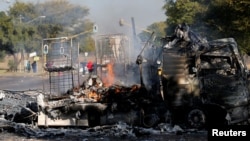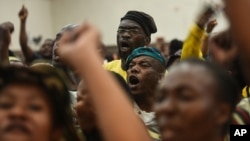Raucous, violent protests have already surfaced ahead of South Africa’s August 3 municipal elections - a trend that analysts say they fear will continue at least until the nation holds its next round of national polls in three years.
“I think it’s clear that things in South Africa will get worse in the next few years economically, politically, in terms of violence,” said analyst Jakkie Cilliers, who heads the Pretoria-based Institute for Security Studies (ISS).
As Cilliers was making her point with the help of slides and graphs derived from months of research, residents of Pretoria’s Atteridgeville township illustrated it in a much blunter way.
On Tuesday morning, just 20 kilometers from the institute's offices, protesters torched vehicles and tires, looted shops and hurled rocks at passing motorists over their unhappiness with the ruling African National Congress.
Cilliers notes that much of this anger stems from the ANC’s choice of leaders - in particular, increasingly unpopular President Jacob Zuma, who has weathered mounting corruption scandals in recent years. His term will end in 2019.
“There’s no doubt that President Zuma is the most important recruitment machine for the Democratic Alliance and the [Economic Freedom Fighters party],” he said. “And the longer that he stays in power and remains at the helm of the ANC, the better those two parties will do.”
Protesters in Atteridgeville said they were particularly upset because the ANC leadership appointed a mayoral candidate who is from another province - instead of the local candidate they preferred. There is also an ethnic angle to this - the ANC’s chosen candidate is from the majority Zulu group, like President Zuma - whereas the area is dominated by the Pedi, or Northern Sotho, people.
Protests on constant rise
But why the violence? Despite South Africa’s violent history, it does not have a history of violent democratic elections - in fact, the nation was hailed for its peaceful first democratic poll in 1994. Since 2010, ISS figures show, violent protests have risen - to the point where the nation sees an average of three protests every day.
Steven Friedman, who heads the Center for the Study of Democracy, says it’s fairly easy to pinpoint the source of the anger - and see why so many people are available to throw rocks in the middle of a weekday.
South Africa’s economy contracted severely at the beginning of this year. Nearly 27 percent of the population is unemployed. And more than two decades after the fall of apartheid, government statistics show that black South Africans are still significantly poorer than their white counterparts.
Friedman argues the rock-throwing masses are actually not the angriest group of South Africans.
“The most angry group of South Africans today is not unemployed people in the townships,” he said. “The most angry group of South Africans, who also have the capacity to do something about their anger, are black middle-class South Africans. And they are angry precisely because, in their view, they have the qualifications that their parents and grandparents didn’t have, they have some of the job opportunities that their grandparents and parents didn’t have, and in their view, they encounter the same racial attitudes that their grandparents and parents encountered.”
Whatever happens, it’s clear that as the Rainbow Nation heads violently toward the August vote, South Africa's democracy may face its toughest challenge yet.





